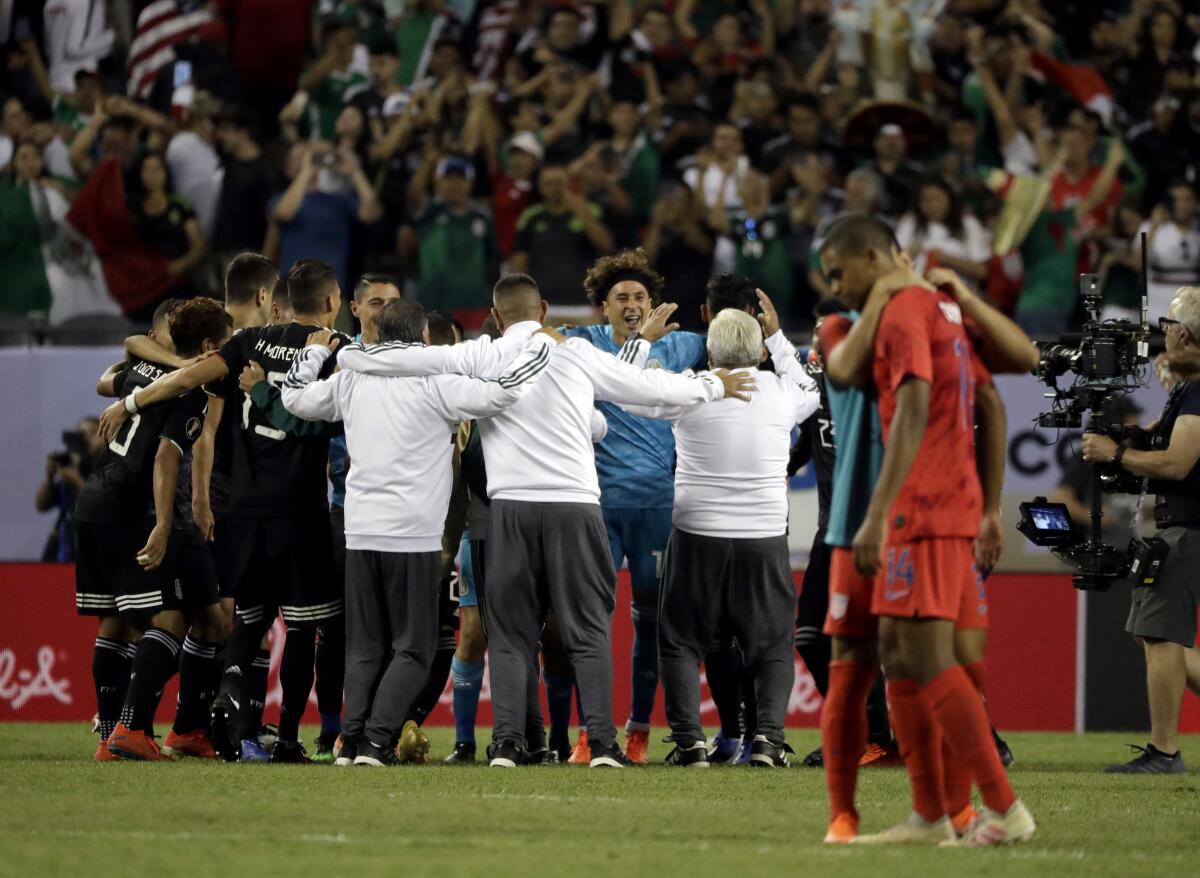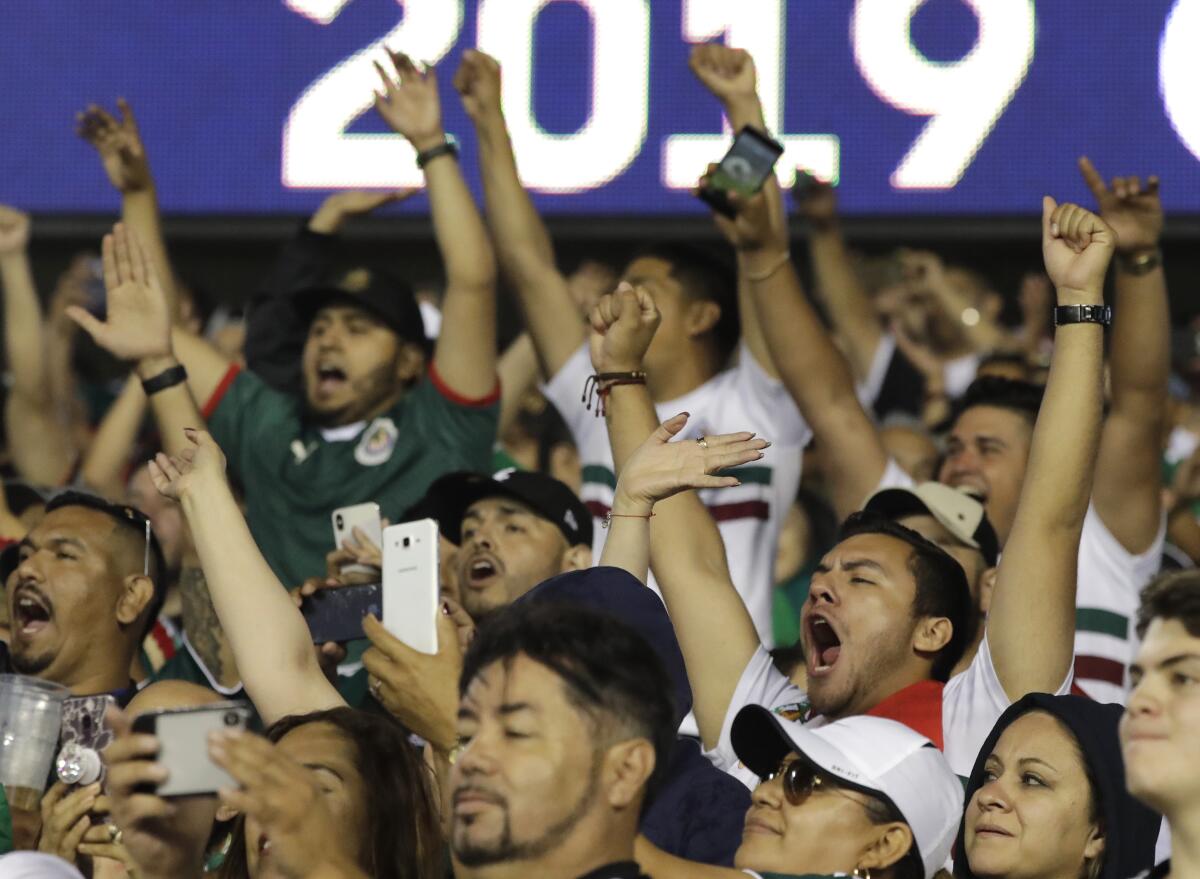After a yearlong absence, Mexican national soccer team again will play often in U.S.

It’s been a lean year for America’s team. And by America’s team, we don’t mean the Dallas Cowboys, New York Yankees or even the U.S. women’s national soccer team.
The America’s team we’re talking about isn’t even based in this country. But with a 2020 survey showing 60 million people in the U.S. self-identify as supporters of the Mexican national soccer team, it may have the largest, most geographically diverse fan base of any team in the U.S.
It has certainly made itself at home here, playing 70 friendlies in the U.S. since 2008, more than 3½ times as many as it played in Mexico during that time. And that doesn’t include competitive matches such as World Cup qualifiers and the biennial CONCACAF Gold Cup that are played in the U.S.
All of which made last year so unusual because, for the first time in 32 years, the Mexican national team didn’t play once on this side of the border.
“It was a different experience,” said Yon de Luisa, president of the Mexican soccer federation. “I think we all had different experiences throughout 2020.”
Mexico will make up for that this year. On Wednesday the federation and Soccer United Marketing (SUM), the New York-based entity that manages the team’s U.S. tours, said Mexico will play a minimum of five exhibitions in the U.S. beginning with a May 30 friendly against Iceland at AT&T Stadium in Arlington, Texas. The rest of the games have not been finalized but most are expected to be played in late spring or early summer.
LAFC’s superstar Carlos Vela answers questions from L.A. Times soccer writer Kevin Baxter in a rare one-on-interview with the former MLS most valuable player.
With Mexico also scheduled to play in the Final Four of the Nations League tournament in June, the CONCACAF Gold Cup in July and a World Cup qualifier in November, Mexico could have as many as 14 games in the U.S. in the final seven months of 2021.
That’s more than it has played in any calendar year in Mexico.
“It’s a balance,” De Luisa said from Mexico City. “We need to understand that even though we have 120 million Mexicans within our borders, we have close to 40 million north of our border. And we have found that our fan base in the U.S., it’s not only the 40 million Mexicans. There are people close to our Mexican relatives in the U.S. that also are fans of our national team.
“So yes, we have responsibilities toward them.”
Money, however, is the biggest reason Mexico plays here so often. Of the 10 largest crowds for a men’s international soccer match in the U.S., outside of the Olympics or World Cup, nine were games involving Mexico. The average attendance was more than 90,000.
Not only are the crowds in the U.S. larger — Mexico has just one stadium with a capacity greater than 55,100 — everything from the sale of tickets to concessions to sponsorships is more lucrative as well. That not only fills the federation’s coffers, but it allows the SUM to schedule better opponents as well, with four of Mexico’s last six friendlies in the U.S. coming against top 25 teams.

“We need to understand the structure of the business,” De Luisa said. “It’s not easy to bring Argentina or Colombia or Uruguay to play in Mexico because the type of income we generate through our match day, it is not comparable to [what] we generate in the U.S. That’s why on the sports side it is important for us to play in the U.S.”
Not being able to play before fans in the U.S. in 2020 because of the pandemic had a major effect on the federation’s finances, about 70% of which comes from sponsorships and game-day sales. As a result, keeping those fans and partners engaged last year, when the national team played just five games, four of them in empty stadiums in Europe, was a major focus.
The federation and SUM, its U.S. marketing arm since 2003, experimented with innovative concepts such as virtual meet-and-greets with their corporate partners and broadcast feeds from Europe that displayed one set of advertisements to viewers in Mexico and another set to viewers in the U.S.
The U.S. once again will not have a men’s soccer team competing at the Olympics, but the best the United States has to offer isn’t allowed on the pitch.
“Not having games was definitely a financial hit. But the benefits of the work we’ve done over the years is we’ve really built the value of the Mexican national team brand, the intellectual property,” said Camilo Durana, the senior vice president of properties and events at SUM. “We were able to retain a good portion of our commercial revenues through a mix of innovation. So we were able to stabilize.
“But there are things we’ve got to deliver in the future as a result.”
Chief among them is the personal contact between the Mexican team and its U.S. fans. According to a 2020 study commissioned by SUM, self-described fans of the national team are a bilingual, bicultural group focused on family and tradition. For many of them, match day in the U.S. is a day-long celebration of Mexican culture and pride that would be difficult to organize without a game at its center.
“On the social side,” De Luisa continued, “it is fundamental for us to play in the U.S. That’s why, in the long term, yes, Mexico will play a lot of matches in the U.S.”









